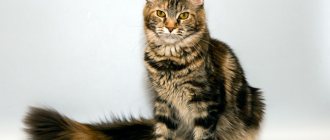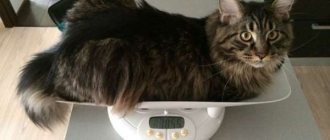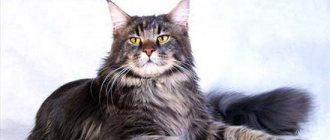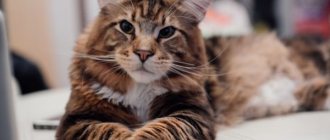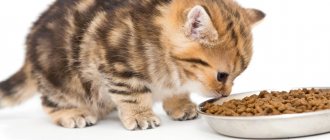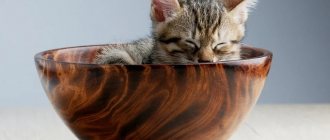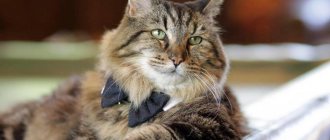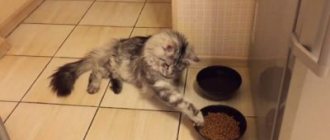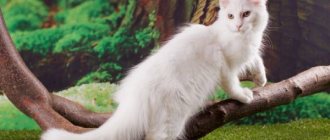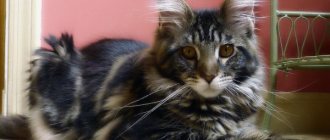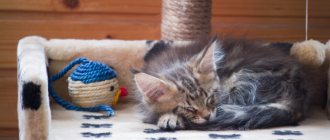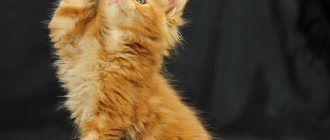Feeding Maine Coon kittens begins at 21-25 days, based on their mother’s quantity and general condition. The main rule of the owner’s hard work is to gradually introduce new foods to new foods.
The main diet should consist of meat, regardless of the month of life. Often breeders give preference to ready-made food from proven brands.
First steps
A cat feeds its kitten for up to 2-2.5 months, but sometimes the mother’s milk may not be enough for actively growing organisms. Therefore, complementary foods are introduced, paying attention to the condition of the little Maine Coon. For the first time, beef meat is suitable, without veins and pre-frozen for 3-5 days to reduce the risk of infection with parasites.
At the age of 1 month, babies do not yet know how to chew; they are taught to do so. A small piece of beef the size of a black peppercorn is offered to the kitten in the palm of your hand, allowing it to sniff and taste it for itself. The meat can be gently placed in the Maine Coon's mouth to encourage him to chew. The next day, feeding is repeated, but twice.
Actions after the first feeding
When the process goes smoothly, the volume of meat is increased, but only slightly. After 3 days, cottage cheese is introduced into the diet. Next, the menu is replenished with raw yolk, preferably from a quail egg. It is given no more than 2 times a week, without the protein part.
Gradually the baby is switched to a full diet, but he continues to feed on his mother. Her milk helps create strong immunity in kittens. By 45 days of birth, everyone in the litter should be able to eat regular food. At the age of 1 month, milk-based porridge will be a good help for natural nutrition.
Allergy testing
Every day the kitten is examined for signs of skin irritation, watery eyes, and other allergic reactions.
Kittens may have loose stools and sometimes vomit. If this is not associated with infections, helminthic infestation, or mechanical damage, then feeding is carefully analyzed and revised. Raw chicken meat is considered a strong allergen for a kitten, and boiled fillet loses all its beneficial and nutritional properties. It is introduced into the diet carefully, in small portions.
Not suitable for food:
- Pork, lamb;
- Food with any flavoring or coloring additives;
- Sweet yoghurts and curds;
- Fat sour cream, cream, whey;
- Bones;
- Food from the human table.
It is advisable to feed the kitten in the same way as a nursing mother. This way food is digested better. Daily feeding includes 5-6 servings of a variety of foods, the basis of which is meat and dairy products. Fresh water should be freely available for a growing Maine Coon.
Although they drink little, on natural food, when a cat is “drying”, it is supposed to consume three times more water than a portion of industrial food.
Nutrition of Maine Coon kittens: first feeding
The first steps in mastering adult food begin at 21 days, making sure that the babies' teeth have erupted and are ready to go. Many experienced breeders initially use canned meat for children: chicken, beef, rabbit, unsweetened curds. It's a good introduction to meat.
The beef is cut into thin small pieces. Some kittens quickly figure out what to do with an unprecedented treat, others will have to put it in their mouth. Be sure to carefully monitor your stool and have an antidiarrheal medication kit on hand.
Age from 2 to 4 months
During this period, the Maine Coon kitten is usually still with the breeder. The mother cat teaches him behavior and hunting in the form of games. He already eats from the common table, but he gets a minimum amount of breast milk per day.
The usual diet of meat, yolk, cottage cheese, thick milk porridge for kittens is replenished with the following products:
- Cream 8-10% fat;
- Vegetables (carrots, pumpkin, cabbage, zucchini);
- Greenery;
- Ocean fish;
- Feeding;
- Natural oil;
Now the kitten's nutrition is increasing significantly. You should not restrict the animal without providing food.
Approximate calculations of food for 1 day for a two-month-old cat:
- 130 g of meat, including fish.
- 40 g vegetables.
- 40 g cottage cheese, kefir, sour cream.
- 15 g cereal porridge with water.
The benefits of salt for kittens are controversial, but many breeders recommend adding a pinch equal to half a teaspoon to a Maine Coon's food. It is better to give any vitamins and mineral supplements for kittens after consulting with a veterinarian and breeder.
By 3 months or later, the kitten will be moving to a new home. You can’t change your diet suddenly; you should stick to your baby’s usual diet and composition. The portion gradually increases, and other products appear on the menu. Food is already provided 4-5 times a day. During the first month of stay with the owner, a smooth transition to a suitable regime is carried out.
Breed Features
Maine Coon translated as “Maine raccoon” (Maine, USA). The weight of an average male is from 6 to 8 kg, females - 3.5-5 kg. Often individual specimens reach 12 or even 15 kg.
These animals are not only the largest among felines, they:
- energetic;
- mobile;
- excellent hunters;
- have a huge fluffy tail and tassels on the ears, a strong skeleton and muscle corset, a wide skull;
- have semi-long hair.
All these features are reflected in feeding. To maintain life potential and health indicators (energy, fur quality), you need not just cat food, but a high-quality diet. Often when taking such a kitten into your home, problems arise. Reviews indicate that animals constantly ask for food. They scream angrily and demand food.
Looking at the characteristics of the breed when preparing the diet, you should make sure that it is:
- balanced;
- with optimal protein content;
- without a predominance of carbohydrates (does not contain grain base, soy and cereals);
- with easily digestible fats (as a source of fat-soluble vitamins);
- rich in mineral components.
Unbalanced and low energy value contributes to overeating, which should not be allowed.
Age 4 to 7 months
An adult Maine Coon should consume a large amount of calories compared to an average-sized cat. However, it is undesirable to overfeed a kitten; problems with joints and digestion are possible. However, by this period many of the kittens are already able to independently regulate the amount of food for 1 day and not eat excess.
Normal feeding consists of a standard set; you can try to include chicken gizzards, hearts, liver and other offal in the diet. For proper nutrition, vegetables, cereals, as well as cottage cheese and whey are still needed.
The only thing that distinguishes a Maine Coon teenager from an established relative in terms of nutrition is the frequency of feeding. The more times he eats, the better the food is absorbed. For a playful and energetic kitten, the energy that comes from protein food is important. Calcium contained in fermented milk products and phosphorus from fish take part in the growth of the musculoskeletal system, jaws and teeth of the kitten.
Many substances affect the condition of the animal’s fur, claws and well-being. As before, feeding requires variety.
Vitamins and supplements
Indicators of a cat's health are:
- coat;
- leather;
- condition of mucous membranes;
- energy;
- lack of rapid fatigue;
- absence of frequent disorders of the gastrointestinal tract.
If these indicators are normal, the animal does not need synthetic vitamins.
Vitamin and mineral supplements are medications. They are prescribed by a doctor based on the results of clinical and laboratory tests.
Industrial feed from an early age
Almost all manufacturers have a division of finished feed by month. On the packaging you can see detailed instructions indicating the serving for one day. The advantage of commercial kitten food is its balance. There is no need to compose and carefully think through the diet; they provide the coon with all the necessary microelements and vitamins. In addition, they simplify the life of the cat owner.
The amount of food for a kitten is calculated individually. The brand chosen is the one that suits the mother. As they grow older, this food is diluted with goat's milk, cream, and then given only dry food (at 3-4 months). The size of the granule depends on the kitten’s ability to eat it without problems.
Canned food is given to an adult animal; for a kitten, either completely natural products or dry food are desirable. Whether food is suitable for a small coon can be determined by the general condition of the animal, stool, activity and the amount eaten.
However, the serving size for kittens does not always coincide with the value in the table on the package. Some cats need more or less food each day. By the time of full maturation and formation (3 years), food consumption is normalized.
Mixed diet
Many owners prefer a mixed type of feeding. It's comfortable. Ready-made food can be kept “just in case,” and natural feeding can be used as a basis.
You can feed or supplement your pet with ready-made food if he wants to eat it.
You can also use dry food while traveling, where it is not possible to prepare food.
What to feed in the first month
During this period of life, the main source of nutrients that allows a pet to develop properly and grow actively is still mother's milk. If this is not possible, it is necessary to draw up a special feeding schedule and prepare special adapted milk formulas.
To fully meet the needs of a fast-growing Maine Coon kitten, you need to gradually introduce complementary foods.
This is interesting! At an early age, a kitten may require special supplements, but any vitamin and mineral complexes must be agreed with a veterinarian and are given strictly in the prescribed dosage.
As a supplement, you can consider products represented by goat's milk, scalded lean meat, and milk porridges. Any new products are introduced once every five to six days, and the appearance of intestinal upset in a pet indicates the need to temporarily discontinue complementary foods.
This is impossible!
- Pork is bad for the liver: this meat is generally not recommended for cats due to its high fat content.
- Bones. Poultry and fish must be completely free of bones.
- Smoked meats, pickles, marinades, sweets, cookies and other canned and confectionery delicacies are not particularly healthy for humans. And for a cat, especially of this breed, it’s even harmful. Chocolate is especially dangerous because of the theobromine it contains.
- Potatoes and other vegetables containing large amounts of starch. The coon's body does not absorb this substance.
- Spices are generally not beneficial for cats and are even harmful to their taste and olfactory receptors.
- Legumes: active gas formation is not always pleasant for humans. This is serious discomfort for a cat, and as a result, the animal’s intestines may stop functioning normally.
- You cannot feed your pets human or dog food. No leftovers or treats from your table. And dog food was invented for dogs: the Maine Coon is not a dog!
In a word: what to feed a Maine Coon is not the most important question. It is more important to know how to feed correctly.
Standards
They are determined by the felinological system adopted in the country. Popular: WCF, TICA, FIFe. In the Russian Federation, WCF is more often used.
| WCF | TICA | FIFe | |
| Body |
| large long body, rectangular in shape |
|
| paws of medium length |
|
| |
| the tail has long hair, its length reaches the shoulder | tail well furred | tail with flowing hair, long | |
| Head | massive skull | the forehead is rounded quite strongly | the forehead is softly rounded |
| high cheekbones | prominent cheekbones | ||
| massive box, square shape | box - square | muzzle - square | |
| massive chin | straight chin | strong chin | |
| the neck is of medium length | muscular neck | neck is strong | |
| Ears |
|
|
|
| Eyes |
|
|
|
| Wool |
|
|
|
| Color |
| any colors |
|
| Defects | coat of one length |
|
|
Feeding recommendations
New foods should be introduced gradually into a kitten's diet. When feeding dry food, the ratio of water and feed should be 3:1, respectively. For a kitten up to one year old, weight gain should be from 400 grams per month (see table of Maine Coon weight by month).
You cannot feed a cat from the owner’s table; this type of food does not meet the needs of the cat’s body and can be harmful to health.
When you need veterinary help
Typically, difficulties arise when a Maine Coon cat gives birth for the first time, and newborns are born with difficulty. You need to call a veterinarian for help if:
- The contractions lasted more than 2 hours, but not a single baby appeared.
- Heavy bleeding began immediately or after childbirth.
- Mom’s temperature dropped below 37 degrees or rose above 40.
- The fetus remains in the birth canal without movement for more than 10 minutes.
The first birth of a Maine Coon is an exciting event, but you should not worry more than necessary. On the contrary, you should study all the necessary information and be ready to provide qualified assistance to your cat. This will allow the owner to react correctly if something goes wrong.
I like1I don't like
Leonardo Quality Selection
Photo: https://beru.ru
The best premium food with natural ingredients. The basis of the diet is chicken meat and hearts, supplemented with zinc, phosphorus, manganese, vitamins E, D, A and B. The composition contains no preservatives or artificial flavors. And one jar is enough for even a large Maine Coon to last a whole day. A balanced diet is perfectly absorbed by the pet’s body and has a positive effect on its appearance.
Leonardo Quality Selection cat food
Advantages:
- reasonable price
- well digested
- efficiency
- versatility
- absence of harmful components
- a lot of meat in the composition
- pleasant aroma
